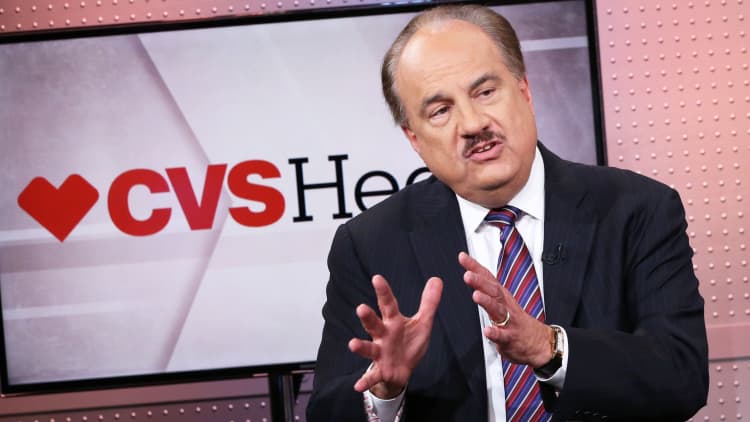CVS Health reported a huge jump in sales in the first quarter Wednesday as customers rushed to get prescriptions and other essentials during the coronavirus pandemic.
The health-care company and drugstore chain warned in an earnings call that it will feel the pain of the pandemic, too. It's seen foot traffic drop off during shelter-in-place orders, coronavirus-related costs rise and a decline in doctor's appointments that leads to fewer new prescriptions.
CVS Chief Executive Larry Merlo said like other companies, it is coping with "an awful lot of uncertainties." But, he said, CVS is in a different position than many other retailers, since it sells medications and health-care items that people need.
"I will say that the nature of our business is to a degree recession-resistant," he said. "I wouldn't describe us as recession-proof."
Here's how the company did in the first quarter ended March 31:
- Earnings per share: $1.91 cents, adjusted
- Revenue: $66.8 billion
- Same-store sales: up 9%
CVS shares rose as high as $63.49 Wednesday, the stock ended the day down 1.3% at $60.41. Shares fell along with a broader sell-off in the market.
Along with sales, use of CVS' website, app and digital services have spiked. Merlo said the trend began in January, but gained steam during the pandemic. Virtual visits through Minute Clinic, its urgent care service, were up 600% compared with the same quarter in 2019. Home delivery of prescriptions rose 1,000%. Use of the company's app increased double digits. And the company had a fourfold increase in the number of customers adding front store items, such as toilet paper or soap, to prescription home deliveries.
CVS owns health insurance company, Aetna. Its digital use was up, too, he said. More households used the Aetna Health app in the first quarter than the first three quarters of 2019 combined, Merlo said.
CVS reported adjusted earnings per share of $1.91. Its revenue for the quarter increased 8.3% to $66.8 billion compared with $61.6 billion for the same period last year. Net income rose to $2.01 billion, or $1.53 per share, in the quarter from $1.42 billion, or $1.09 per share, a year earlier.
Wall Street anticipated earnings per share of $1.63 cents on revenue of $64.01 million, based on a survey of analysts by Refinitiv. However, it's difficult to compare reported earnings to analyst estimates as the pandemic disrupts typical shopping patterns and the global economy.
CVS did not change its financial outlook for 2020 earnings and cash, despite many other companies withdrawing them because of the pandemic. The company said it expects its 2020 earnings to be between $7.04 to $7.17 per share, adjusted, and its cash flow to be between $10.5 billion to $11.0 billion.
It withdrew other parts of its outlook, though, citing the effects of Covid-19.
The drugstore chain has kept stores open as an essential retailer during the pandemic. It's sold cleaning supplies, over-the-counter medications and prescriptions. It's also opened drive-thru testing locations and announced plans to ramp up to nearly 1,000 sites by the end of May and process up to 1.5 million tests per month, so long as supplies and lab capacity are available.
Sales were strong across the stores. CVS said the pandemic caused more customers to order 90-day prescriptions, get early refills of medications and buy a larger volume of household goods and health items.The company's same-store sales in pharmacy were up 9.3% and same-store sales in the front of the store rose 8% in the quarter. Prescription volume was up sharply, by nearly 10%.
CVS is one of the retailers that has hired during the pandemic. It announced in late March that it planned to hire 50,000 people in part-time, full-time and temporary roles to keep up with demand.
But even some essential retailers have felt the pandemic's effects. Drugstore competitor Walgreens' fiscal second-quarter earnings illustrated a mixed picture as customers stockpiled, but then sheltered in place. In its earnings call in April, the international drugstore chain said same-store sales were up 26% in the first 21 days of March. But, it said, they dropped by a mid-teens percentage rate the last week of the month, as foot traffic declined and fewer people bought discretionary items like beauty products.
CVS is one of five major U.S. retailers that plans to add more drive-thru testing sites. The drive-thrus are staffed by CVS. It plans to open the new sites in store parking lots. Its current drive-thrus are set up in large parking lots with enough space for multiple lanes. They use Abbott Laboratories' rapid testing device, which allows patients to get test results in minutes.

Correction: Walgreens' fiscal second-quarter earnings illustrated a mixed picture as customers stockpiled, but then sheltered in place. An earlier version misstated the quarter.


